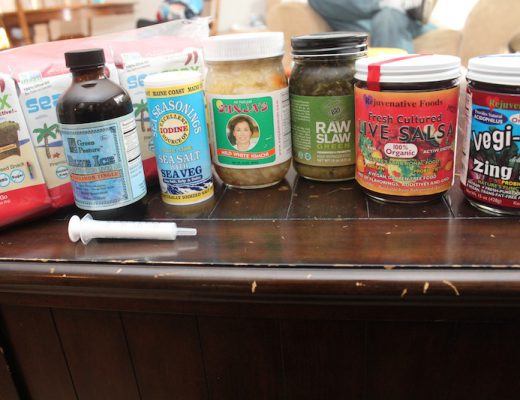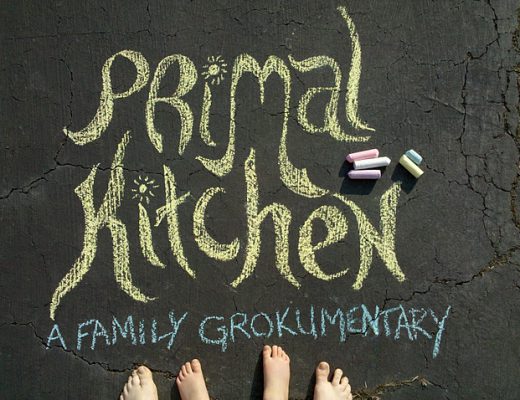If you haven’t yet heard, Wednesdays are our Guest Blogger Series day! It’s a day where Matt and I get a bit of a mid-week break while getting to share with you some of our favorite online bloggers. And for their hard work, they get the benefit of your readership – we encourage you to please show all of them your support by visiting their blog and social media links at the end of this post!
Alison from PaleoNonPaleo came to us with the tremendous story of her battle for her sons’ health. We were very impressed and decided that we must share it with you! Hope you enjoy it as much as we do and visit her blog for a variety of awesome posts. We were featured last month in her round up of best tips of paleo bloggers.
2000
I am being rushed down the hospital corridor on a gurney, the overhead lights flashing by, the masks on the nurse’s faces barely concealing their anxiety. I knew raising twins was going to be tough, but I wasn’t ready for this. I hadn’t expected having them would start off this badly. I felt I was in a scene from ER. George Clooney was probably just around the corner.
A c-section rapidly ensued and the first baby came out. Then other one, the baby we were all going through this for. His heart rate had kept dropping dangerously low and not recovering quickly. His placenta was giving up the fight and it had got to the point he was safer out than in. They were 32 weeks gestation.
They were fragile.
And I was terrified.
As the doc pulled his head out, the second baby, later to be named Oliver, opened his eyes, turned his head through a whole 180 degrees, and back to the center again, surveying the whole scene. Then, he started bawling. Me and you, both, buddy, I thought. Me and you, both.
Eventually, both boys both came home from the hospital and Oliver, in particular, was a happy, strong baby. Despite his prematurity, he hit all his milestones dead on time. I wasn’t concerned. I did notice he was prone to colds, though. He caught one immediately he came home from the hospital at a month old.
Colds, bronchitis, asthma, RSV (Respiratory syncytial virus) were the cause for many a trip to the pediatrician in his early years. Breathing treatments and inhalers were a normal part of our winter routine. One Fall, when Oliver was two, our pediatrician suggested we have him take medication every day for four months to prevent viruses taking hold. We complied. And by some measure we were successful – he didn’t get badly sick at all that year. The medicine had ‘worked.’
The following year, when Oliver was three and a half, he suddenly got very tired. He was cranky. He’d always been a good slee per (but didn’t need as much of it as I would have liked,) yet now he seemed exhausted. He was normally active and now he was listless.
per (but didn’t need as much of it as I would have liked,) yet now he seemed exhausted. He was normally active and now he was listless.
I took him to the pediatrician; she suspected mononucleosis. That’s rare in a child this young, but possible. We had to wait three days to test him and treatment would be just rest anyway. There was no cause for alarm.
Later I took him home, and lay him on the couch to watch some TV. He started to twist his body awkwardly so that his head was at an angle to his body. By the end of Sesame Street, he was holding his head at an 80 degree angle to his body. He couldn’t hold it up. And he was in incredible pain. We went back to the doctor.
An MRI discovered that in addition to mono, Oliver had an abscess in his throat. The abscess was causing swelling in his airway that was threatening to close up. He was twisting his head around oddly because the abscess obstructed his airway. He was in danger of suffocating himself.
Late night emergency surgery followed along with morphine, steroids, antivirals, antibiotics and enough painkillers to stun an elephant. It was tough.
A few days later, as he transitioned off the IV, they gave him painkiller in a cup. It was bright red. Within minutes, he went from lying, sick and tired in his bed, to jumping on it, giggling with delight and making everyone think he was much improved. His surgeon saw him just at that moment. He was sent home that day. When I look back now, I see that he was effectively a happy drunk on the red dye in the medicine.
When he got home, Oliver recovered slowly from his surgery, it took him several months to regain his strength and fight off infection. I still remember the dark circles under his eyes and his skinny frame where before he’d been a rather rosy, robust boy.
At the time, we ate a diet similar to our friends. Pizza, fishsticks, chicken nuggets. Apple sauce, ice cream, cookies. It makes me cringe now to think I fed them those little Viennese sausages in tins. The boys loved them. Dinner was never a hassle when they were on the menu. And I was all for avoiding hassle. Anything to lower the stress of twin boys, one enough work for three mothers.
 2004
2004
By the time of his fourth birthday in the Spring, Oliver was back to normal. Or rather, more than normal. He’d been a happy, sunny baby, but on weaning had turned into a defiant, very active toddler. Now he was constantly rushing about, not listening, refusing to comply with any request. I thought this might be normal 4 year-old stuff but even I could see compared to his twin and other kids around him, this was excessive. But I hoped he’d grow out of it. And no-one else seemed concerned. It was just me that was exhausted, after all.
Kindergarten was a relief, it gave him an outlet for his incessant energy, lots of social interaction and a break for me. Occasionally I’d get feedback about his impulsiveness (like I needed to be told, right?) and inability to follow directions but again, we all thought he’d grow out of it.
First grade came around, though, and things just got worse. More sitting, greater expectations and an inexperienced teacher combined with Oliver’s personality to turn school into a daily ordeal for everyone. Every day I dreaded pick-up. What was I going to hear about today? Who had he hit? Which adult had he defied with what I knew could be breath-taking insolence?
What confused everyone was that at times Oliver could be the most charming and engaging child who everyone simply adored. The teachers were frustrated because Oliver is a very smart boy. He could do the work. He simply refused to do it. In the absence of an obvious cause, the mother (me,) naturally, was blamed and I felt red-hot eyes boring into my back as I walked around the campus. We were a ‘problem family.’
2006
Oliver’s sensitivity at what he perceived to be slights threw him into rages. He’d roll back his head and scream and scream. He’d throw things in the classroom. I remember going to collect him after one incident. He was curled up in a fetal position under a table. In despair, I got under there with him and we sobbed together, in front of the teacher, holding each other until we were calm.
I wondered what on earth was going to happen to us.
The toll on the family was immense. We couldn’t live like other people yet we looked like other people. Unless you got close. Then you could see we weren’t. We couldn’t visit friends, go on vacation, or even know how each day would go.
It was like living with a terrorist.
With no-one seeming to offer any solution and our home life getting more and more ragged while school authorities became more and more overbearing, I started to research the connection between behavior and food. It was all I could think of. And it was all I could do. It gave me control. It made me feel I had some power in this maelstrom of torment.
In addition to rages, I’d noticed Oliver’s rapid weight gain despite little food passing his lips. Tests showed he was hypoglycemic and his blood sugar regulation was erratic. He also had sleep apnea. I felt sure there was a food trigger.
I started to change his diet. While I was removing processed foods and sugars from his diet, I read about this ‘stone-age’ diet. While the premise of this way of eating – meat, vegetables, little fruit or dairy, no wheat or sugars – made sense, the number of food items we could actually eat seemed crazily undoable at the time and seriously on the fringe. I put it aside.
2007
We started to homeschool. This was partly because Oliver couldn’t be accommodated in a regular classroom, partly because we wanted to take the pressure applied by the school authorities off the whole family (we were past caring about academics by this point,) and partly because we wanted to control his food. The elementary school years are a bear to those who want to feed their children healthy!
We were still seeing incidents of hyperactivity and defiance. I hadn’t found the perfect solution. But I was still sure diet held the key. I’d read about the gluten-free/casein-free diets and their help with autism… except Oliver didn’t have autism and we were already restricting so many foods, it felt impossible. We were limiting sugar and removing artificial additives, preservatives or dyes, and foods containing a high amount of salicylate, a chemical naturally found in vegetables and fruits. To take out wheat and dairy would leave us eating what exactly? Once again, I felt defeated. We carried along on our rollercoaster.
One day, on a 2-hour trip to see yet another doctor, Oliver was polite and happy and calm as can be. I was amazed. I was so pleased that just before our appointment, I let him have a steamed milk from Starbucks. In ten minutes our calm, happy, centered boy turned into a crazy, silly, giggly child who took no instruction, defied anyone who tried, who spun around on his chair incessantly, smart-mouthed the doctor and refused to be examined. The doctor, clearly irritated, sent him out of the room after 5 minutes, turned to me and asked, “Have you considered Ritalin?”
The answer was no, although we got close. Instead the experience had given me undeniable proof that food was the issue. And that dairy was a problem. Something was happening between ingesting the food and this wild behavior.
I started to read up on neurobiology. I learned about neurotransmitters and words like ‘dopamine,’ and ‘serotonin.’ I even got someone to help me pronounce ‘epinephrine.’ I learned about leaky gut and how anti-inflammatories, steroids and other pharmaceutical drugs can destroy the lining of the stomach, enabling chemicals in our food to travel to our brain causing havoc similar to that I’d witnessed in our son. I thought back to that day in the hospital room and the happy, giggly boy who took red medicine, yet who was so sickly for months after we got him home.
2008
Slowly, slowly, I learned what worked for him. Meat, veggies, occasional fruit, limited dairy. No sugar, no wheat. Sound familiar? I thought back to the references to the ‘caveman’ diet. It still seemed “out there.”
And it was very hard to do without support. We went back and forth, limiting foods but without much knowledge and with plenty of sabotage from the environment we live in, it was difficult. Oliver lost a lot of weight but put it back on again. We would have times of strictness and calm and moments of dietary slackness and tantrums. But we made progress, if slow at times. Evolution has taken millions of years. We weren’t that slow. J
2010
The words ‘primal’ and ‘paleo’ were popping up in forums I frequented. I learned more about it, did the diet myself. Noticed how I got calmer and more energy. And I remember how I’d dismissed it all those years ago, how it had worked. I recommitted myself to the diet and started to transition my family. This time for good.
Now things had changed. Paleo is considered, if not yet mainstream, at least not too far from it. There are recipe sites and forums, blogs and conferences. There was plenty of places for me to go when I was lost. We know no-one in real life who eats this way so online communities have been essential to my knowledge and my sanity.
2012
Oliver has blossomed. He is a different boy. He is polite, happy, bright-eyed, sunny and charming. Gone are the rages, the  screaming, the defiance, the eye-popping insolence. He is cooperative at school, well-liked by his peers and a star performer at his local children’s theater. He wakes up full of energy and we know how the day will broadly go. He is particularly proud of the slimmer physique that enables him to shoot baskets and run laps alongside the 6th grade jocks at his middle school. I couldn’t be more proud.
screaming, the defiance, the eye-popping insolence. He is cooperative at school, well-liked by his peers and a star performer at his local children’s theater. He wakes up full of energy and we know how the day will broadly go. He is particularly proud of the slimmer physique that enables him to shoot baskets and run laps alongside the 6th grade jocks at his middle school. I couldn’t be more proud.
If you were to tell me five years ago, our family would be in this position, I’d have kissed you. I thought juvy, wilderness retreats and jail visiting were in our future. I’d read up on special schools with padded rooms. I thought we’d be using college funds for jailbonds and calls in the middle of the night would be part of our weekly routine. It was a future I dreaded with every fibre of my being. What we had already lived through was nightmare enough; the logical conclusion to that life, had we not discovered the paleo “secret,” would have been tragic.
That couldn’t be further from my thoughts now as I look on this boy. The life we lived up to the age of six was what it was. I fed my family what everyone around me did, perhaps even a bit healthier. And there were certainly times when we needed to take advantage of the resources modern medicine had to offer.
But it took five years to recover Oliver from the chemical insults he took during those preschool years. And the whole family, including his twin, went through a terrible time in the process. The work to cook food for him was so hard for me because I, myself, was living in a fog of processed food, sugar and grains. When I think that I was searching and searching and yet stumbled on the answer almost immediately, and repeatedly, it makes me realize how important sites like Paleo Parents are for taking the paleo message and making it ‘normal.’
If I had my time over, I’d do things differently. I’d feed us all paleo foods and limit medicine to the bare minimum. I’d have learned to cook earlier and cut down the milk and got rid of the wheat. I’d have been less reverent to my pediatrician’s advice.
In just a few years, paleo has gone from this weird, almost-no-foods diet to being a legitimate alternative to the ‘calories in, calories out,’ low fat, grain-based diet we’ve been encouraged to follow. And I’ve learned that no-one but me knows us well enough to know what’s right for us. Not doctors, not gurus, not parenting experts, not school authorities.
So these days, no-one tells me what to do. Well, they do, but I’m listening to a different voice. Only guidelines can be offered. It is up to us to discover the rest. We need to keep an open mind, learn, experiment, find our unique answer.
Maybe, like me, you’ll find it’s closer than you think.
Alison Golden has been fully paleo for eighteen months, has lost two dress sizes, and recovered herself from endometriosis. During this time, she transitioned her whole family and now has a website, PaleoNonPaleo focused on practical advice and strategies for living paleo in a non-paleo world. She would love you to pay a visit! 🙂





